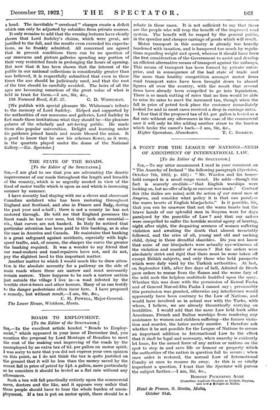THE LATE LORD SUDELEY.
[To the Editor of the SPECTATOR.] SIR,—Lord Sudeley's work in connexion with our museums and picture galleries has received such ungrudging support from you that I feel sure you will be glad to know how greatly he was encouraged during the present year, and especially quite recently, by the many evidences of the high appreciation in which the lectures given in those institutions are held. A gratifying instance of this was forthcoming in the early part of the year. He was already aware of the widespread desire to hear the lectures which existed among that large section of the public which is at work during the daytime, and whose only opportunity of gaining some knowledge of the ancient world and the arts comes in the evenings. This desire took practical shape when it was suggested that if expense were the only obstacle to the opening of the British Museum in the evenings those anxious to hear the lectures would gladly assume responsibility for the cost• if, as they hoped, this was not prohibitive. Thanks to Sir Frederick Kenyon and the trustees, the proposal was accepted and every facility was given, on the understanding that no expense fell on the public funds.
A series of lectures was arranged in February which gradually developed, until in the autumn a comprehensive programme was entered upon which provided for three simultaneous lectures on Tuesday evenings from October to March. The charge for admission was fixed at two shillings for each lecture, this being the highest amount which it was considered reasonable to impose having regard to the sources from which the audience were drawn, and bearing in mind that they came from an area extending to fifteen miles from Bloomsbury. Over 2,500 tickets have been issued to the members of the staff of one City institution alone, and this without any publicity or canvassing, but simply as the result of a spontaneous demand on the part of those who had beard the earlier lectures and had infected others with their enthusiasm. The possibilities of the Museum in this respect are limited, and except for this fact it is safe to say that many thousand more tickets could have been sold. Unfor- tunately, also, the question of cost still stands in the way of the provision of public lectures in the evenings at two shillings
a head. The inevitable " overhead " charges create a deficit which can only be adjusted by subsidies from private sources.
It only remains to add that the evening lectures have clearly shown that Lord Sudeley's claims, which were great, are justified to the full, and the results even exceeded his expecta-' tions, as he frankly admitted. All concerned are agreed that in present conditions there can be no question of our museums and picture galleries spending any portion of their very restricted funds in prolonging the hours of opening. But now that it has been shown that the interest of the public in our national collections is considerably greater than was believed, it is respectfully submitted that even in these times the axe should be judiciously used, and that the root of the tree should be carefully avoided. The heirs of all the ages are becoming conscious of the great value of what is held in trust for them.—I am, Sir, &c., [We publish with special pleasure Mr. Whiteman's tribute to the memory of Lord Sudeley. Helped and supported by the authorities of our museums and galleries, Lord Sudeley in fact made these institutions what they should be—the pleasure palaces of the scholarly and art-loving public. He made them also popular universities. Delight and learning under his guidance joined hands and music blessed the union. It is good to know that he saw his schemes flower, as it were, in the quartets played under the dome of the National Gallery.—En. Spectator.]











































 Previous page
Previous page